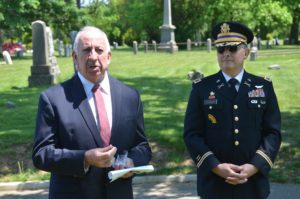By Richard Goldenberg
New York Army National Guard Soldiers associated with the Jewish War Veterans joined local Jewish leaders to recognize the first Jew to receive the Medal of Honor.
The short ceremony at Cypress Hill Cemetery in Brooklyn on May 21 honored Private Benjamin Levy, who was recognized for his heroic actions in combat on June 30, 1862.
New York Army National Guard Col. Richard Goldenberg, assigned to the state headquarters, Chaplain (Maj.) Raziel Amar, chaplain for the 501st Ordnance Battalion, and New York Guard Capt. Mark Getman, part of the state defense force, helped render honors to Levy.
Levy, who was a 17-year-old drummer boy, picked up the flag of the 1st New York Volunteer Infantry under a hail of enemy fire and rallied his regiment, preventing a retreat. He received the Medal of Honor in March 1865 and died at age 76 in July 1921.

Rabbi Irv Elson and Col. Richard Goldenberg
The Jewish Community Centers Association of North America and the Jewish Welfare Board Jewish Chaplains Council sponsored this commemoration.
“With Memorial Day coming upon us, we wanted to gather here at the site of one of New York’s earliest Medal of Honor recipients, to recognize his bravery and the sacrifice of so many other American service members that followed,” said Vice President and Director of the Jewish Welfare Board Jewish Chaplains Council, retired U.S. Navy Chaplain (Capt.) Rabbi Irv Elson.
President and CEO of the JCC Association of North America Doron Krakow said Levy influenced future generations.
“Firsts matter a great deal, as without them we can never know those that follow,” Krakow said. “Our presence today, here at the gravesite of Benjamin Levy, is an opportunity to remember all of the members of our community who have given heir lives in the service of our country.”
A color guard from the New York Army National Guard’s 107th Military Police Company also volunteered to take part in the ceremony.
Levy’s actions were significant because during the Civil War a regimental flag, or colors, had tactical as well as ceremonial significance. The flag marked the regiment’s line in battle. Soldiers looked for the colors to see where they should be. The most senior sergeant had the job of protecting the flag. The enemy concentrated its fire on the sergeant holding the flag. If he went down and the colors fell, it could cause troops to retreat.
Levy picked up the flag that day, after 15 members of the color guard were killed or wounded.
Levy, born in 1845 in New York City, enlisted in the Union Army in October 1861. Only 16 at the time, Levy and his younger brother, Robert, volunteered to serve as drummers, Benjamin with the 1st New York Volunteer Infantry and Robert with the 7th New York Volunteer Infantry Regiment.
“Levy was the child of immigrants,” Goldenberg said, “and like so many New Yorkers of his time and now ours, he volunteered to serve his family’s adopted country in a time of crisis.”
“It’s fitting that today we honor Levy with a color guard, the symbol of service that he selflessly braved Confederate fire to save from capture and use to rally his regiment,” Goldenberg said.
In June of 1862, Levy’s regiment arrived to reinforce the Army of the Potomac just after the Battle of Fair Oaks, which was fought May 31 to June 1, 1862. On the morning of June 30, while the regiment formed for muster, the Confederates attacked. The 1st New York ran to the action. Levy, whose drum was broken, grabbed the musket of his ill tent mate, Jacob Turnbull, and joined the fight.
Passing through dense woods, the regiment moved to ambush the flank of approaching Confederate forces. However, the enemy moved on the New York Volunteers from another direction and the Battle of Glendale began around 3 p.m.
In less than ten minutes, four color sergeants and eleven corporals comprising the color guard all fell to intense fire. Only one escaped, the remainder killed or wounded in less than ten minutes.
Levy saw his color bearer, Charley Mahorn, fall from a bullet wound. Levy charged ahead and picked up the unit colors to rally his regiment in defense until relieved by other Union forces.
At the end of the fight, 230 1st New York Soldiers were killed, wounded, or missing; a quarter of the men who went into action.
The citation says Levy exhibited “extraordinary heroism …. and when the Color Bearers were shot down, carried the colors and saved them from capture.”
After his initial two-year service, Levy reenlisted in January 1864 and was severely wounded in the thigh during the Battle of the Wilderness, receiving a discharge due to disability in May 1865.
Rabbi Amar provided traditional Hebrew memorial prayers and the group then placed stones on the gravesite.
“We thought the stones, as a more traditional act in the Jewish faith, were more appropriate than a wreath,” Elson said.
Sgt. Letty Luiz, the noncommissioned officer in charge of the color guard, then provided a rendition of taps.
“It was really fun participating in this,” Luiz said. “Our company just held a uniform inspection this past weekend for drill, so we were able to come up with the volunteers and I’m glad we did.”
To end the ceremony, Krakow intoned the traditional Hebrew message for mourners: “Baruch Dayan Emet” which means “Blessed is the True Judge” and acknowledges “God’s plan for all.”
Then, he added, “And God Bless America.”
Volume 75. Number 2. 2021

